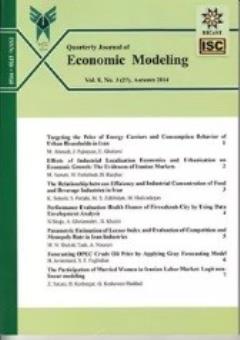-
-
List of Articles
-
Open Access Article
1 - The impact of financial inclusion on economic growth: a cross-country analysis
Akram Ghoreyshvandiabrak Saleh Ghavidel Doostkoui Masoud Soufi Majidpour -
Open Access Article
2 - The relationship between exchange rate overshooting and currency substitution in Iran’s economy
Seyed Mansour Heshmati Sanzighi Rahman Saadat Esmaeil Abounoori -
Open Access Article
3 - Investigating the impact of political risk on the shadow economy: A quantile panel approach
Ther Saadoon Shnaishel Yousef Mohammadzadeh Ramin Bashir Khodaparasti Shahab Jahangiri -
Open Access Article
4 - Application of stochastic differential equations in predicting stock price behavior
Behrouz Piri Iranshahi Davood Jafari Seresht Ali Akbar Golizadeh Seyed Ehsan Hosseinidoust -
Open Access Article
5 - The dynamic impact of inflation and parametric reforms on the financial imbalance of the social security organization in Iran (with an emphasis on the Seventh Development Plan Law)
Ali Siami علیرضا عرفانی Seyed Mohammad Mostolizadeh -
Open Access Article
6 - Investigating return and volatility spillovers among selected industries of the Iranian stock market: TVP-VAR Extended Joint and DCC-GARCH approaches
Hadi Esmaeilpour Moghadam Emad Sharifbagheri
-
The rights to this website are owned by the Raimag Press Management System.
Copyright © 2021-2026







